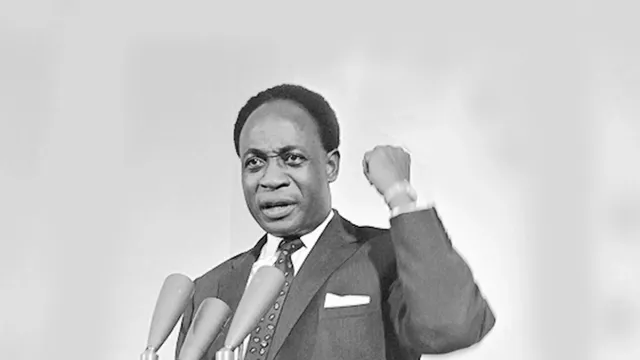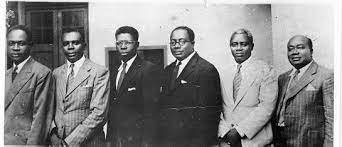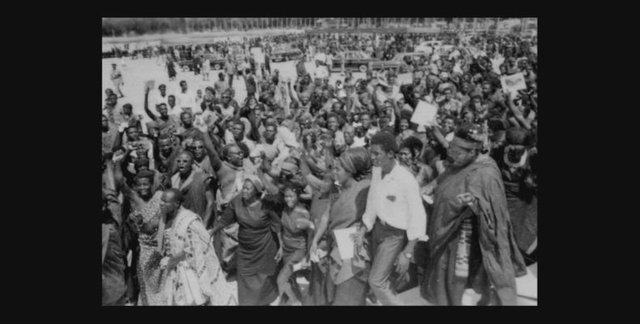Kwame Nkrumah was born in Nkroful on 21st September, 1909. His birth name Francis Nwia-Kofi Ngonloma was changed to Kwame Nkrumah because his teachers could not pronounce it. He went to Achimota College and pursued his dream of becoming a teacher.

He taught several schools in the Gold Coast from 1930 – 1935. Nkrumah saved money while he was a teacher to study abroad. In 1935 he sailed for London and upon arrival, he applied for an American visa. He left that same year to America Where he got admission to Lincoln University of Pennsylvania. He finished his Bachelor of Arts Degree, Sacred Theology degree and then earned his Master of Science degree from the University of Pennsylvania in 1942. He went on to get another Masters degree in philosophy the following year. He was also elected President of the African Students Organization of the United States and Canada. Nkrumah then traveled back to London and got involved in organizing the 5th Pan-African Congress in Manchester. He also worked towards decolonization of Africa by founding the West African Nation Secretariat. He was also chairman of “The circle”; A secret society that would provide the raison d’être for the emancipation of Africa. Plans of the West African Nation Secretariat was to form Union of West African Socialist Republics.

Kwame Nkrumah was invited to be become the General Secretary of the United Gold Coast Convention in 1947, an opportunity that he accepted and sailed back for Gold Coast. It took him a few months to make the journey. This was also an opportunity to push forward the plans of Union of West African Socialist Republics slated in October, 1948 at Lagos, Nigeria. So, right from the beginning Nkrumah understood his mission as returning to liberate the Gold Coast and Make Ghana the Liberated zone for the total liberation of West Africa and Africa as whole.. Nkrumah arrived on 8th December,1947 and the U.G.C.C was officially launched on 29th December in Saltpond.

The objective of the U.G.C.C was “to ensure by all legitimate and constitutional means the direction and control of government should pass into the hands of the people and chiefs in the shortest possible time”. This meant that no boycotts, demonstrations, rebellious uprising, strikes and positive action. Nkrumah strongly opposed this and believed it would not get them anywhere.
In January 1948, the Ga chief, Nii Kwabena Bonne III, known in private life as Theodore Taylor had organized a boycott of all European imports in response to their inflated prices. The boycott's aim was to press the foreign traders known as the Association of West African Merchants (AWAM) to reduce the inflated prices of their goods.The boycott was followed by a series of riots in early February 1948. The day the boycott was scheduled to end, 28 February, coincided with a march by veterans of World War II.

Three Ex-servicemen were short and killed and 60 wounded. Riots broke in Accra, and businesses own british were looted. On the same day, the local political leadership, the U.G.C.C, led by the Kwame Nkrumah, sent a cable on the same day to the Secretary of State in London:
"...unless Colonial Government is changed and a new Government of the people and their Chiefs installed at the centre immediately, the conduct of masses now completely out of control with strikes threatened in Police quarters, and rank and file Police indifferent to orders of Officers, will continue and result in worse violent and irresponsible acts by uncontrolled people."
They also blamed the Governor Sir Gerald Creasy (whom they called "Crazy Creasy") for his handling of the country's problems. The UGCC cable further stated:
"Working Committee United Gold Coast Convention declare they are prepared and ready to take over interim Government. We ask in name of oppressed, inarticulate, misruled and misgoverned people and their Chiefs that Special Commissioner be sent out immediately to hand over Government to interim Government of Chief and People and to witness immediate calling of Constituent Assembly."
The immediate aftermath of the riots included the arrest on 12 March 1948 of Kwame Nkrumah and other leading activists in the U.G.C.C party (namely Ebenezer Ako-Adjei, Edward Akufo-Addo, J. B. Danquah, Emmanuel Obetsebi-Lamptey and William Ofori Atta), who were held responsible for orchestrating the disturbances and were detained, before being released a month later. The arrest of the leaders of the U.G.C.C raised the profile of the party around the country and made them national heroes
NKRUMAHIST